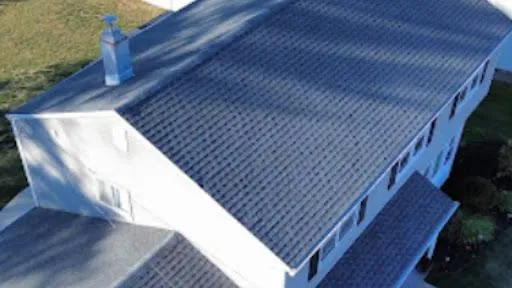Blogs

Best Weather for Roof Replacement: What You Need to Know
For roofing in Palmyra, NJ, fall (September to November) is the best time for a roof replacement, thanks to ideal temperatures and minimal rainfall. Spring can also work, though rain may cause delays. Summer offers warm weather, but high demand and heat can affect scheduling and materials. Winter should be avoided due to freezing temperatures and safety concerns.
Timing is crucial for roof replacement, as weather impacts the success and durability of your project. In Palmyra, NJ, the best time for replacement depends on the season. Understanding these conditions ensures smoother installation and better material performance.
At Northeast Exteriors, we offer reliable roofing services in Palmyra and surrounding areas, and we're here to guide you on the ideal time for your roofing project.
Key Takeaways
The best time for roof replacement in Palmyra, NJ is typically during the fall, thanks to mild temperatures and reduced rainfall.
Spring offers mild weather but can bring rain delays that may extend project timelines.
Summer is a busy season for roofers, with higher temperatures that may cause discomfort for workers and affect materials.
Winter is not recommended for roof replacement due to freezing temperatures, snow, and ice.
Monitoring weather forecasts is key to staying on schedule for your roofing project.
The Ideal Seasons for Roof Replacement
When scheduling roof replacement in Palmyra, NJ, the weather plays a vital role. Here's a breakdown of the best and worst times to replace your roof, ensuring a smooth and successful project.
1. Fall (September to November)
Why Fall is Ideal for Roof Replacement Fall is the optimal season for roof replacement in Palmyra, NJ. The moderate temperatures and dry weather create ideal conditions for both the crew and materials.
Comfortable Temperatures: Ranges from 70 to 80°F (21-27°C), perfect for roofers and materials.
Reduced Rainfall: Fewer rain delays, ensuring a smoother project timeline.
Prepares for Winter: Helps safeguard against winter snow and ice, preventing damage and leaks.
2. Spring (March to May)
Spring Offers Mild Weather but Rain Concerns Spring brings mild temperatures, making it a comfortable time for roofers. However, the increased rainfall can delay the project.
Mild Temperatures: Ranges from 50 to 70°F (10-21°C), ideal for roofing work.
Potential Rain Delays: Spring’s rain can extend the project timeline.
More Availability: Contractors are typically less busy, making scheduling easier.
3. Summer (June to August)
Warm Weather but a Busy Roofing Season Summer offers warm weather that is beneficial for roofing materials, but the heat can cause discomfort for workers, and demand for contractors peaks.
Warm Weather: Temperatures above 80°F (27°C) make roofing materials pliable.
High Demand: Roofing contractors are often booked for months during summer.
Heat Concerns: Extreme temperatures can lead to worker fatigue and safety risks.
4. Winter (December to February)
Avoid Roofing Projects in Winter Winter is the least favorable time for roof replacement due to freezing temperatures, snow, and ice.
Freezing Temperatures: Asphalt shingles may not adhere well in cold weather, compromising the roof.
Safety Hazards: Snow and ice pose risks to workers, making the job unsafe.
Material Issues: Certain materials, like shingles, need specific temperatures to adhere properly.
Key Considerations for Roof Replacement
When planning your roof replacement, several factors can impact the outcome. Weather monitoring and material selection are two critical considerations that ensure your roof is installed efficiently and effectively.
Weather Monitoring
Stay Prepared for Weather Fluctuations
Regardless of the season, monitoring weather forecasts before and during the project is essential to avoid delays.
Be Flexible with Timelines: Weather changes, such as rainstorms or high winds, can delay work.
Prepare for Unpredictable Conditions: Extreme temperatures may require rescheduling to ensure proper installation.
Plan for Seasonal Variations: Seasonal shifts, like unexpected cold snaps or summer storms, may cause interruptions.
Material Selection
Choose the Right Materials for Optimal Performance
Different roofing materials require specific temperature conditions for proper installation. Selecting the correct materials based on the season is key for long-lasting results.
Asphalt Shingles: Best installed in moderate temperatures for proper adhesion.
Extreme Weather Concerns: Cold or heat may affect material durability and installation quality.
Consult with Experts: A roofing contractor like Northeast Exteriors can guide you in selecting materials suitable for the season.
Choosing the Right Roofing Material for Your Home
Selecting the right roofing material is crucial for your home’s protection and aesthetics. Different materials have varying lifespans, energy efficiencies, and visual appeal. Let’s explore the most common roofing options and help you decide what’s best for your home.
Asphalt Shingles: Affordable, durable, and versatile, perfect for most homes.
Rubber Roofing: Ideal for flat roofs, offering waterproof protection and durability.
Fiberglass Coatings: Provides excellent insulation and is resistant to harsh weather.
Metal Roofing: Long-lasting and energy-efficient, though it can be more expensive.
Slate and Tile: A premium option for homes requiring a distinctive, long-lasting roof.
How to Find Reliable Roofing Contractors in Your Area
Choosing the right roofing contractor is essential for a smooth roof replacement. Here’s what to look for when selecting a reputable contractor, ensuring quality work and a stress-free experience.
Licensing and Insurance: Ensure your contractor is licensed and fully insured for safety and compliance.
Experience: Look for a contractor with years of experience and a portfolio of completed projects.
Customer Reviews: Read reviews and testimonials to gauge past customer satisfaction.
References: Ask for references to speak with past clients directly about their experiences.
Written Estimates: Get detailed, written estimates before committing to a roofing company.
Roofing Maintenance Tips to Extend the Life of Your Roof
Proper roof maintenance is essential to increase the lifespan of your roof. Regular upkeep helps catch issues early, preventing costly repairs and extending your roof’s durability.
Regular Inspections: Schedule professional roof inspections every 1-2 years.
Clean Gutters: Keep gutters clean to prevent water damage and debris buildup.
Remove Debris: Clear off leaves, branches, and moss to avoid wear and tear.
Check for Leaks: Inspect the attic and ceilings for signs of leaks or moisture buildup.
Maintain Flashing: Ensure flashing around vents, chimneys, and skylights is intact and sealed.
Frequently Asked Questions About Roofing Services
Do you need a roofing permit in NJ?
Yes, a roofing permit is typically required in NJ for roof replacements or significant repairs. Check with your local municipality for specific requirements, as they may vary by location.
How long do roofs last in NJ?
Roof lifespan in NJ varies by material. Asphalt shingles last around 20-30 years, while metal and tile roofs can last 40-70 years with proper maintenance.
When should you replace a roof?
Replace your roof if it shows signs of major wear, such as missing shingles, leaks, or extensive damage. Typically, roofs should be replaced every 20-30 years, depending on the material.
How do you know when you need a roof?
Signs you need a roof replacement include visible leaks, missing or damaged shingles, sagging, and an aging roof (over 20 years old). Regular inspections help identify potential issues early.
Contact Us for Expert Roofing Services in Palmyra, NJ Today!
Ready to upgrade your roof? Contact Northeast Exteriors today for expert roofing services in Palmyra, NJ. Our skilled team is ready to assist with roof replacement, repairs, and new installations, ensuring high-quality results and outstanding customer satisfaction. Let’s get started!
Hours
Monday: 8:00AM - 6:00PM
Tuesday: 8:00AM - 6:00PM
Wednesday: 8:00AM - 6:00PM
Thursday: 8:00AM - 6:00PM
Friday: 8:00AM - 6:00PM
Copyright © Northeast Exteriors 2025. All Rights Reserved. Privacy Policy. Terms & Conditions. Web Design by Fused Media





